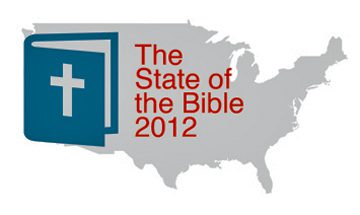So, how is the Bible doing these days? Are people still believing it? reading it? Still holding it in high esteem?
Or, in our increasingly secular culture, is the Bible going the way of the Sears Catalog and VHS tapes?
 The American Bible Society recently commissioned an in-depth survey the seeks to answer these questions and many more. (You can download a PDF of the study results here.) Here are some of their findings:
The American Bible Society recently commissioned an in-depth survey the seeks to answer these questions and many more. (You can download a PDF of the study results here.) Here are some of their findings:
• 47% of American adults believe the Bible has too little influence in society today (but among Mosaics, ages 18-27, only 37% said the Bible has too little influence while 25% said the Bible has too much influence)
• 55% read the Bible to be closer to God, down 9% (from 64%) in 2011
• 79% believe they are knowledgeable about the Bible but 54% were unable to correctly identify the first five books of the Bible (12% of Mosaics answered “Matthew, Mark, Luke, John, and Revelation”)
• 46% believe the Bible, the Koran and the Book of Mormon are different expressions of the same spiritual truths, 46% disagree
• On average, 85% of U.S. households own a Bible; the average amount of Bibles per household is 4.3 (I guess the .3 is for those who own Bible that contain only Matthew, Mark, Luke, John, and Revelation.)
• 36% of Americans read the Bible less than once a year or never while 33% read the Bible once a week or more
Americans’ beliefs about the Bible are highly varied by age. Only 34% of those age 18-27 vs. 62% age 66 and older believe the Bible contains everything a person needs to know about living a meaningful life.
In tomorrow’s post, I’ll dig a little deeper into The State of the Bible survey. Today, I want to make just a couple of comments.
First, not surprisingly, esteem for the Bible and use of the Bible is slipping in our society. There are lots of reasons for this, ranging from assaults on Scripture from popular cynics, to the misuse of the Bible by confused Christians, to the overall secularization of our culture. Yet, at least in principle, the Bible continues to matter a great deal to a great many people.
Second, I often get cranky when examining survey’s like The State of the Bible survey because of the way questions are phrased. I’m not saying I could do any better, mind you. But surveys, almost by necessity, tend to simplify that which is not necessarily so simple. Take, for example, the last bullet point in the list above:
• Americans’ beliefs about the Bible are highly varied by age. Only 34% of those age 18-27 vs. 62% age 66 and older believe the Bible contains everything a person needs to know about living a meaningful life.
This is the sort of thing that gives me heartburn. Why? Because, if I had been asked to respond to this statement about the Bible, I don’t know what I would have said. One the one hand, I hold the Bible in high esteem as God’s Word. I have devoted much of my life to the study and teaching of the Bible. I believe it reveals truth that is essential to living a fully meaningful life. But, I’m not sure I would say that the Bible contains everything a person needs to know about living a meaningful life. After all, in order to live a meaningful life, it helps to know how to speak a language, how to find and prepare food, how to make babies, how to read, and so on. These things aren’t taught in Scripture. So, I would be inclined to respond negatively to the “everything a person needs to know” statement. Yet, such a response would tend to be understood as devaluing Scripture. Thus, I’d need to decide whether to be accurate or to answer in a way that seems to give the survey what it wants. Like I said, this gives me heartburn.
I’ll say more about The State of the Bible 2012 tomorrow. In the meanwhile, your comments are always welcome.











